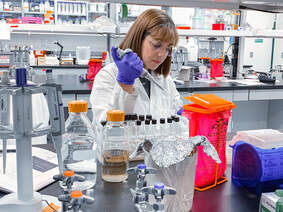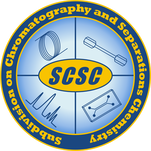2024
The American Chemical Society Subdivision of Chromatography and Separations Chemistry sponsors two student poster awards with a prize of $250 USD each. CerTech sponsored one Industrial Research & Development poster award in 2022 with a prize of €250.

Multidimensional Poster Award 2024
Elena Mosham, California State University Los Angeles (Vozka Laboratory)
Advancing Fingerprint Deposition Modeling through the Integration of Comprehensive Two-Dimensional Gas Chromatography and Time-of-Flight Mass Spectrometry for Age Estimation
Poster Description
Fingerprints are being extracted and analyzed using comprehensive two-dimensional gas chromatography with time-of-flight mass spectrometry to develop a fingerprint deposition aging model. The goal of this project is the determine this aging model by detecting squalene and cholesterol and calculating a peak ratio between the compounds to determine how this ratio changes with fingerprint aging time.
Elena Mosham, California State University Los Angeles (Vozka Laboratory)
Advancing Fingerprint Deposition Modeling through the Integration of Comprehensive Two-Dimensional Gas Chromatography and Time-of-Flight Mass Spectrometry for Age Estimation
Poster Description
Fingerprints are being extracted and analyzed using comprehensive two-dimensional gas chromatography with time-of-flight mass spectrometry to develop a fingerprint deposition aging model. The goal of this project is the determine this aging model by detecting squalene and cholesterol and calculating a peak ratio between the compounds to determine how this ratio changes with fingerprint aging time.

Multidimensional Poster Award 2024
Daniela F. Gutiérrez-Muñoz, Arizona State University (Bean Laboratory)
Identifying putative volatile biomarkers for S. aureus methicillin-resistant and small-colony variant subtypes
Poster Description
Cystic fibrosis lung infections that are caused by methicillin resistant Staphylococcus aureus (MRSA) and/or small colony variant (SCV) S. aureus are associated with worse patient outcomes than staph lung infections that are methicillin sensitive (MSSA) or normal colony variants (NCV). The goal of this project was to identify putative volatile biomarkers to discriminate these S. aureus infection subtypes, which we accomplished by culturing 110 clinical S. aureus isolates in triplicate, collecting and analyzing their volatile metabolites via thin-film microextraction coupled with two-dimensional gas chromatography time-of-flight mass spectrometry, and creating random forest classification trees. We found that the volatile metabolites of the MRSA-SCV subtype is unique from other S. aureus strains, which may lead to biomarkers to detect these types of S. aureus lung infections via breath testing.
Awards History
Multidimensional GC Award (ACS Subdivision of Chromatography & Separations Chemistry)
- 2024: Elena Mosham, California State University LA, USA & Daniela F. Gutiérrez-Muñoz, Arizona State University, USA
- 2023: Lina Mikaluinaite, University of Washington, USA
- 2022: Emily Higgins Heppler, Arizona State University, USA
- 2021: Caitlin Cain, University of Washington, USA
- 2023: Liesa Verscheure, RIC Biologics, Belgium
- 2022: Alessia Arena, University of Messina, Italy
- 2021: Devin Makey, University of Michigan, USA
- 2022: Laura McGregor, SepSolve Analytical
